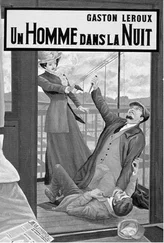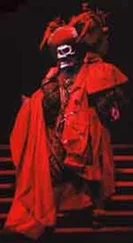Dom Claude listened in silence. All at once his deep-set eye assumed so sagacious and penetrating an expression, that Gringoire felt himself, so to speak, searched to the bottom of the soul by that glance.
“Very good, Master Pierre; but how comes it that you are now in company with that gypsy dancer?”
“In faith!” said Gringoire, “‘tis because she is my wife and I am her husband.”
The priest’s gloomy eyes flashed into flame.
“Have you done that, you wretch!” he cried, seizing Gringoire’s arm with fury; “have you been so abandoned by God as to raise your hand against that girl?”
“On my chance of paradise, monseigneur,” replied Gringoire, trembling in every limb, “I swear to you that I have never touched her, if that is what disturbs you.”
“Then why do you talk of husband and wife?” said the priest. Gringoire made haste to relate to him as succinctly as possible, all that the reader already knows, his adventure in the Court of Miracles and the broken-crock marriage. It appeared, moreover, that this marriage had led to no results whatever, and that each evening the gypsy girl cheated him of his nuptial right as on the first day. “‘Tis a mortification,” he said in conclusion, “but that is because I have had the misfortune to wed a virgin.”
“What do you mean?” demanded the archdeacon, who had been gradually appeased by this recital.
“‘Tis very difficult to explain,” replied the poet. “It is a superstition. My wife is, according to what an old thief, who is called among us the Duke of Egypt, has told me, a foundling or a lost child, which is the same thing. She wears on her neck an amulet which, it is affirmed, will cause her to meet her parents some day, but which will lose its virtue if the young girl loses hers. Hence it follows that both of us remain very virtuous.”
“So,” resumed Claude, whose brow cleared more and more, “you believe, Master Pierre, that this creature has not been approached by any man?”
“What would you have a man do, Dom Claude, as against a superstition? She has got that in her head. I assuredly esteem as a rarity this nunlike prudery which is preserved untamed amid those Bohemian girls who are so easily brought into subjection. But she has three things to protect her: the Duke of Egypt, who has taken her under his safeguard, reckoning, perchance, on selling her to some gay abbé; all his tribe, who hold her in singular veneration, like a Notre-Dame; and a certain tiny poignard, which the buxom dame always wears about her, in some nook, in spite of the ordinances of the provost, and which one causes to fly out into her hands by squeezing her waist. ‘Tis a proud wasp, I can tell you!”
The archdeacon pressed Gringoire with questions.
La Esmeralda, in the judgment of Gringoire, was an inoffensive and charming creature, pretty, with the exception of a pout which was peculiar to her; a naïve and passionate damsel, ignorant of everything and enthusiastic about everything; not yet aware of the difference between a man and a woman, even in her dreams; made like that; wild especially over dancing, noise, the open air; a sort of woman bee, with invisible wings on her feet, and living in a whirlwind. She owed this nature to the wandering life which she had always led. Gringoire had succeeded in learning that, while a mere child, she had traversed Spain and Catalonia, even to Sicily; he believed that she had even been taken by the caravan of Zingari, of which she formed a part, to the kingdom of Algiers, a country situated in Achaia, which country adjoins, on one side Albania and Greece; on the other, the Sicilian Sea, which is the road to Constantinople. The Bohemians, said Gringoire, were vassals of the King of Algiers, in his quality of chief of the White Moors. One thing is certain, that la Esmeralda had come to France while still very young, by way of Hungary. From all these countries the young girl had brought back fragments of queer jargons, songs, and strange ideas, which made her language as motley as her costume, half Parisian, half African. However, the people of the quarters which she frequented loved her for her gayety, her daintiness, her lively manners, her dances, and her songs. She believed herself to be hated, in all the city, by but two persons, of whom she often spoke in terror: the sacked nun of the Tour-Roland, a villanous recluse who cherished some secret grudge against these gypsies, and who cursed the poor dancer every time that the latter passed before her window; and a priest, who never met her without casting at her looks and words which frightened her.
The mention of this last circumstance disturbed the archdeacon greatly, though Gringoire paid no attention to his perturbation; to such an extent had two months sufficed to cause the heedless poet to forget the singular details of the evening on which he had met the gypsy, and the presence of the archdeacon in it all. Otherwise, the little dancer feared nothing; she did not tell fortunes, which protected her against those trials for magic which were so frequently instituted against gypsy women. And then, Gringoire held the position of her brother, if not of her husband. After all, the philosopher endured this sort of platonic marriage very patiently. It meant a shelter and bread at least. Every morning, he set out from the lair of the thieves, generally with the gypsy; he helped her make her collections of targes* and little blanks** in the squares; each evening he returned to the same roof with her, allowed her to bolt herself into her little chamber, and slept the sleep of the just. A very sweet existence, taking it all in all, he said, and well adapted to revery. And then, on his soul and conscience, the philosopher was not very sure that he was madly in love with the gypsy. He loved her goat almost as dearly. It was a charming animal, gentle, intelligent, clever; a learned goat. Nothing was more common in the Middle Ages than these learned animals, which amazed people greatly, and often led their instructors to the stake. But the witchcraft of the goat with the golden hoofs was a very innocent species of magic. Gringoire explained them to the archdeacon, whom these details seemed to interest deeply. In the majority of cases, it was sufficient to present the tambourine to the goat in such or such a manner, in order to obtain from him the trick desired. He had been trained to this by the gypsy, who possessed, in these delicate arts, so rare a talent that two months had sufficed to teach the goat to write, with movable letters, the word “Phoebus.”
* An ancient Burgundian coin.
** An ancient French coin.
“‘Phoebus!’” said the priest; “why ‘Phoebus’?”
“I know not,” replied Gringoire. “Perhaps it is a word which she believes to be endowed with some magic and secret virtue. She often repeats it in a low tone when she thinks that she is alone.”
“Are you sure,” persisted Claude, with his penetrating glance, “that it is only a word and not a name?”
“The name of whom?” said the poet.
“How should I know?” said the priest.
“This is what I imagine, messire. These Bohemians are something like Guebrs, and adore the sun. Hence, Phoebus.”
“That does not seem so clear to me as to you, Master Pierre.”
“After all, that does not concern me. Let her mumble her Phoebus at her pleasure. One thing is certain, that Djali loves me almost as much as he does her.”
“Who is Djali?”
“The goat.”
The archdeacon dropped his chin into his hand, and appeared to reflect for a moment. All at once he turned abruptly to Gringoire once more.
“And do you swear to me that you have not touched her?”
“Whom?” said Gringoire; “the goat?”
“No, that woman.”
“My wife? I swear to you that I have not.”
Читать дальше









